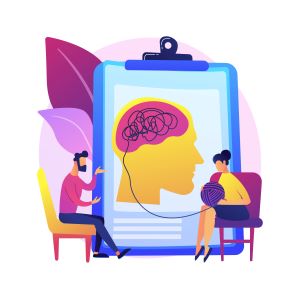After discussing the problems that brought the clients into my real or virtual office, I explain that I’m a certified hypnotherapist. Hypnotherapy is an option to bring about change quicker and often very helpful for pain whether physical or emotional. Some people are surprised and excited but others look at me as though I’m the White Rabbit in Through the Looking Glass. Thank you Hollywood for the bad rap. Here are the top 5 myths of hypnosis that I have heard over the years.
1st Myth
“You will make me do things, like bark like a dog when someone says the word purple.” I have heard this type of statement very often. Again thanks to media, the idea that someone can be “made” to do something while “in a trance” has made it’s way into popular media and stage hypnosis. When we are in a hypnotic state (brain waves of a range of lengths) we take in information as fact. Little children are believed to be in this state when they are learning in early childhood. That’s why they learn like their brains are sponges and yes, believe in the tooth fairy. Once we are past the age of 6 or so, we have developed the active brain states so we now have a means to discriminate information so we can reject information.
Stage hypnotists pick members of the audience who are eager and more likely to do what is suggested. Additionally these hypnotists don’t generally ask people to do things that are that outlandish so it appears that hypnosis is the cause. The real cause is the right choice of audience member and acceptable acts such as barking when the hypnotist says “purple”.
2nd Myth
“I can’t be hypnotized.” I have had family members that told me this and I tell them the same that I tell my clients. “Everyone can be hypnotized and do so on a daily basis several times a day. It’s a natural brain state and every human being with a nice healthy brain does so. As we wake and fall asleep we go through this state. That’s why it is good to learn things during these times as they are more likely to be remembered. Thanks to something called circadian rhythm, we go through regular ups and downs through the day that include this state. Also during a traumatic event, we often go into hypnotic state which may account for the vivid recall of the memories.
3rd Myth
“I don’t’ want to go under.” I personally would like to go Australia but other then ‘the down under” that there is no “go under” in hypnosis. The hypnotic state is a time of strong concentration and we are generally more and not less aware. We are relaxed, our eyes are closed and we are participating in visualizations, and often responding to the hypnotist and this requires strong concentration. At anytime we can open our eyes, get up and leave the room. I have had people coming in for sleep issues fall asleep during hypnosis because they are relaxed and sleep deprived. However when we fall asleep our minds go into a different range of wave lengths and are no longer in the hypnotic state. We also cannot get stuck in hypnosis because these states are very fluid. Today, there are devices like the Muse Headset which measures brain waves so that the wearer can meditate or prepare to sleep and do so consciously.
4th Myth
“Hypnosis means that the devil can enter into me because I’m vulnerable,” This type of statement I have heard though not as common as the others. Again this is an idea that we are somehow in some altered state that isn’t “us” and therefore at risk. I have had people say that during visualizations that unexpected visitors appeared such as loved ones who have passed or religious leaders. These “visitors” often add to the overall positive experience and offer praise and encouragement. There is no scientific evidence suggesting that this is a possibility.
5th Myth
“You will control me during the session.” This type of statement comes from a fear that while in a hypnotic brain state, the person loses all control. Again not a fact. A person is concentrating and may lose track of time, but not lose control of their bodies. During hypnosis, you may not move around very much since we encourage relaxation but that isn’t the same as losing control. Another fear related to this is that the hypnotist then exerts control over the person. Granted things said at this time will be taken in as fact, but we can reject anything said as easily and readily as we accept what is said to us. The hypnotist is a guide, but all hypnosis is self-hypnosis.
Ethics and Hypnosis
I have been asked by people over the years, if I can help retrieve a so-called lost memory. The answer is “No way!” Guided imagery is the primary vehicle for hypnosis and requires us to imagine many things – walking down staircases or watching leaves fall from a tree for example. What is more likely to happen then retrieving some lost memory is the creation of a false memory based on what we may have thought happened. Ethical hypnotists will not offer to help anyone retrieve a memory.
Hypnosis as Treatment
Thanks to research and positive press, hypnosis is gaining ground as a viable tool to change our thinking and behavior in a way that works for us. The point of therapy is to help people meet their goals for therapy and hypnosis is another way to do just that. To learn more, click here.
 Skip to content
Skip to content


